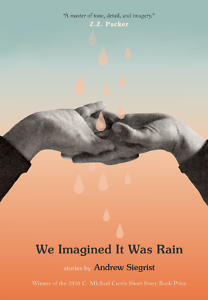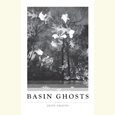Tennessee Stormwater
Andrew Siegrist rides the winding river of the human spirit in We Imagined It Was Rain
The winner of the 2020 C. Michael Curtis Short Story Book Prize, We Imagined It Was Rain is an immersive debut collection of loosely connected short stories from Tennessee native Andrew Siegrist. Each story functions as a tributary feeding into the same winding river, flooded with legends, evocative imagery, and carefully crafted characters. While set in modern times, these stories are imbued with a timelessness deeply rooted to their setting — Tennessee tales of love, loss, faith, and mystery.
 Siegrist’s characters are ordinary people with everyday concerns, and yet there is an invocation of the extraordinary threading their lives together, often embodied by the elemental power of water. In one story, a grieving father discovers a coffin in the woods rumored to be full of saltwater. In another, a brother and sister take their father out on his boat, where he’s asked them to assist in his suicide. A man drinks from a jar of stormwater whenever he’s struck by his desire for something stronger. A father leads his children to the woods to witness a “rainpainter,” collaborating with the rain to make wild paintings with dyes made of berries or crushed creek pebbles. A small-town pastor reckons with the wreckage of his marriage and with his flooded church, clearing one storm-soaked hymnal after another. In this collection, water is heralded as a destructive force as well as a creative one, signaling something beyond human understanding.
Siegrist’s characters are ordinary people with everyday concerns, and yet there is an invocation of the extraordinary threading their lives together, often embodied by the elemental power of water. In one story, a grieving father discovers a coffin in the woods rumored to be full of saltwater. In another, a brother and sister take their father out on his boat, where he’s asked them to assist in his suicide. A man drinks from a jar of stormwater whenever he’s struck by his desire for something stronger. A father leads his children to the woods to witness a “rainpainter,” collaborating with the rain to make wild paintings with dyes made of berries or crushed creek pebbles. A small-town pastor reckons with the wreckage of his marriage and with his flooded church, clearing one storm-soaked hymnal after another. In this collection, water is heralded as a destructive force as well as a creative one, signaling something beyond human understanding.
In two different stories, we encounter the harrowing story of Mary the circus elephant who in 1916 killed her trainer and was hanged in Erwin, Tennessee. In “Elephants,” two school boys look for Mary’s tusks at her gravesite near the railroad tracks after dark, where one boy silently wishes “that there was no black and white photo of it that made me sick to my stomach. Because a wish like that was silly when there are moms that can’t get out of their own beds and uncles that no longer come around and take their nephews hunting.”
 In “How to Hang a Circus Elephant,” Siegrist employs a second-person point of view toward the town official who acted as Mary’s executioner, which creates an instructive tone heavy with the weight of inevitable death. “You will unlock the train shed where the crane is stored. When you hang an elephant it is best to tighten three chains around its neck, but you won’t know this yet.” The narrative lingers with the man after the hanging, around the dinner table with his children, explaining that Mary “is with God now, knee deep in cool water blowing a trunkful high into the air.”
In “How to Hang a Circus Elephant,” Siegrist employs a second-person point of view toward the town official who acted as Mary’s executioner, which creates an instructive tone heavy with the weight of inevitable death. “You will unlock the train shed where the crane is stored. When you hang an elephant it is best to tighten three chains around its neck, but you won’t know this yet.” The narrative lingers with the man after the hanging, around the dinner table with his children, explaining that Mary “is with God now, knee deep in cool water blowing a trunkful high into the air.”
Siegrist’s ability to utilize different points of view on the same historic event in these stories permeates such a sweeping tragedy with a sense of intimacy, creating empathy amid more immediate feelings of despair.
We see how these characters encounter one another on occasion, never in an overwrought way, natural as a rumor travelling through the grapevine of a rural town. In several stories, characters are haunted by the local folklore of a young woman with eyelashes so long they are braided. In “Nightmare Prayers,” her story is illuminated:
He heard that her father had taught her how to divine sacred ground, how to move slow through the lost parts of the woods and feel for God’s breath. And once she got the hang of it, she charged a week’s pay to show people where to bury their prayers. She’d even dig the hole for them. And sure enough the following spring they’d come back with prayers answered to the spot she’d marked and see that something beautiful had grown. But one year nothing bloomed, and people claimed the prayers they’d buried hadn’t been answered.
In a story called “Jaima,” a little girl notes “some things cast shadows even at night, and some animals don’t make noise when they walk.” Siegrist’s characters observe and listen to their world with an attentiveness tied to survival, and we are rapt alongside them — waiting for the storm to roll in, awestruck by the prismatic light in the aftermath, connecting us to something poignantly human.
Following in the lineage of Southern writers like Flannery O’Connor and William Faulkner, Siegrist depicts characters both graceful and grotesque, often with a capacity for both when faced with stark hardships. Outsiders on the fringe of society, as well as community leaders such as pastors, all entwine in this gorgeous ecosystem of contemporary Southern life.

Lauren Turner is a writer and musician (Lou Turner, Styrofoam Winos) in Nashville. She is an M.F.A. candidate in poetry at Randolph College and the author of Shape Note Singing, her debut chapbook from Vegetarian Alcoholic Press. Her most recent album, Songs for John Venn, was deemed “some kind of low-key masterpiece” by Aquarium Drunkard.


